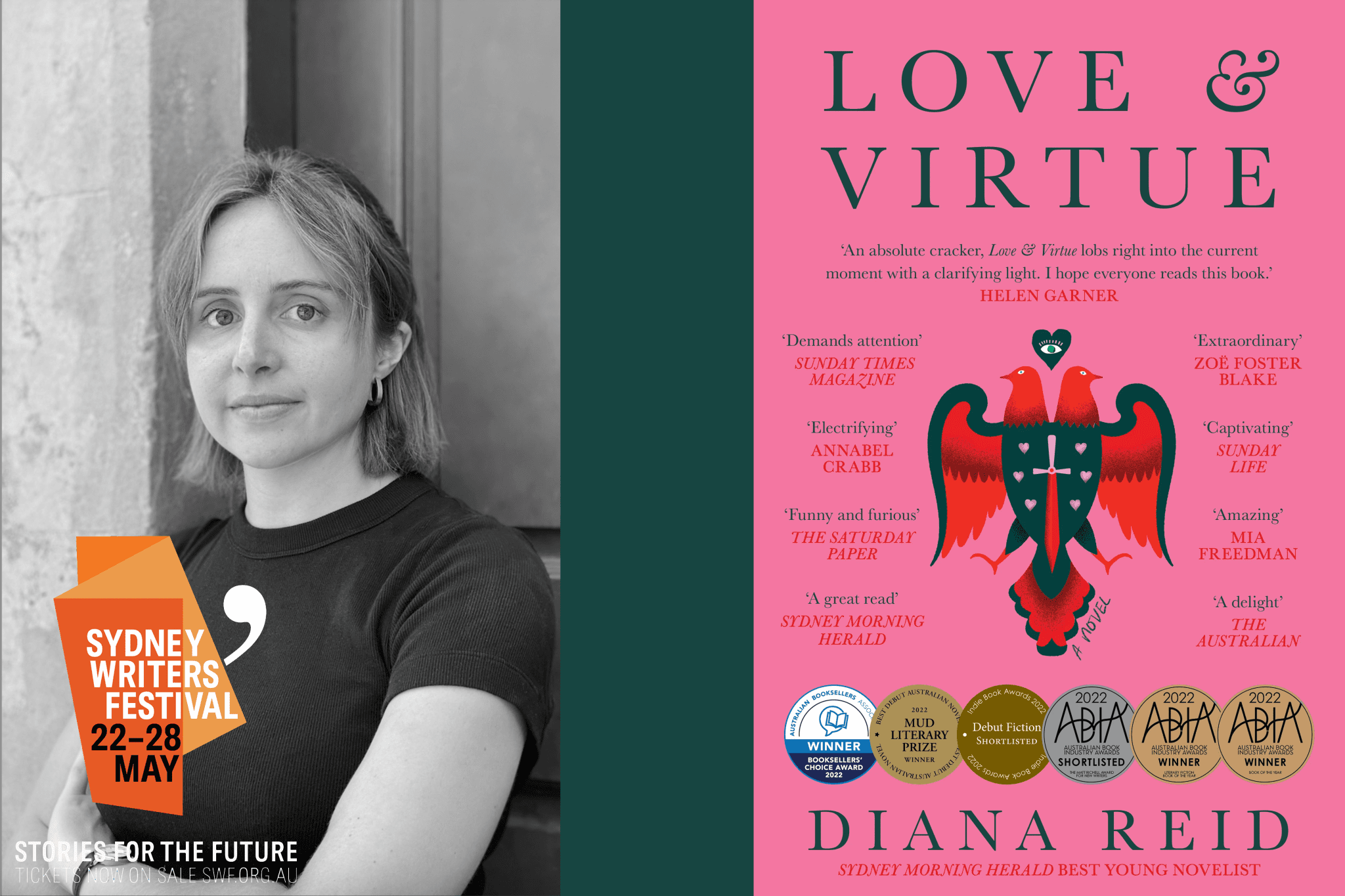When Diana Reid’s debut novel Love & Virtue released in the spring of 2021, it was met with critical acclaim and reception — the work quickly became a bestseller, winning the ABIA Book of the Year award in 2022, and making Reid The Sydney Morning Herald’s 2022 Best Young Australian Novelist. Yet, in spite of this widespread audience, Love and Virtue, and Reid’s sophomore novel Seeing Other People, are distinctly intimate stories of coming-of-age and self-discovery within the suburbs of Sydney. Ahead of her appearances at the Sydney Writers’ Festival (SWF) on 25 May, alongside fellow authors Shirley Le (of Funny Ethnics) and Kate Scott (of Compulsion), Reid spoke to me (over email) about the implications of location in her novels, the influence of the philosophy classes she undertook at Sydney University on her writing, and on her SWF panel’s topic — what does it mean to come of age?
When it comes to what exactly draws Reid into coming-of-age stories, the malleability of young people’s character is what excites her most.
“I love the idea that people’s personalities aren’t set in stone—that they can be shaped by the experiences they undergo and the people they meet. As a novelist, that idea is dramatically interesting and as a person in the world, I just think it’s exciting: it gives our relationships meaning and our choices resonance.”
Very few pieces of literature concerning young people are set in Sydney, and the fact that both of Reid’s novels are set in suburban Sydney is significant to many readers (including myself) who yearn for new stories they can quickly relate to and vividly imagine — it is as if we have Melina Marchetta’s Looking for Alibrandi, or Kathy Lette and Gabrielle Carey’s Puberty Blues, for our own time. Whether set at an uncannily familiar (and toxic) university residential college, Charlie and Helen’s sharehouse “in Enmore (or Newtown, depending on who was asking)” — as noted in Seeing Other People — or Eleanor’s Potts Point apartment, Reid too recognises the influence of stories set at home.
“As Australians, we’re all so accustomed to consuming culture about foreign places. I think reading stories set at home can be really powerful. It sort of gives us permission to think of our lives as worthy of artistic attention.
“And, yes, for both my books I would say place is intrinsic to the characters’ stories. In Love & Virtue, which is a campus novel, the institutional setting of the university is crucial, particularly where it imposes on the characters a particular worldview or way of thinking. In Seeing Other People, place does not so much shape the characters’ perspectives, as their moods. It’s all about the hedonism of a Sydney summer.”
Both Reid’s novels appear to interrogate morality and what it means to be a “good person” — in fact, she says that “almost all novels (whether coming-of-age or not) address moral questions. Wherever you’ve got a character moving through time, making active choices, ethical questions are going to arise.”
Reid associates her excitement of morality to studying philosophy at university, saying “[it] definitely honed my particular fascination — not because it clarified my thinking around what it means to be good, but just because I gained a greater appreciation for how endlessly complicated these questions are.”
When I ended the interview on a lighter note, asking Reid what excites her most about writing stories and the fact that other people are reading, and loving them, she said that it was “[a] tough question! I honestly just feel so lucky to have the opportunity to write and be read, I still pinch myself all the time.”
Reid is, however, most of all fascinated by the amount of collaboration it takes to get a book published.
“I honestly just feel so lucky to have the opportunity to write and be read, I still pinch myself all the time. I would say though that one exciting thing, which has perhaps come as a bit of a surprise, is the extent to which publishing is a team effort. I think there’s this perception that writing is a very monastic and lonely occupation. But so many people are involved in taking a Word document and turning it into a beautiful object that people pick up in store. And that sense of community and teamwork is really special, because when a book succeeds it’s not just a success for the author—you get to share it with everyone who worked on it, from editors to booksellers and everyone in between.”
Diana will be speaking at the Sydney Writers’ Festival at Carriageworks in Eveleigh. She will be in panel at Beginnings: Generations, at 12pm on Thursday 25 May; and in panel at Coming of Age, at 3pm on Thursday 25 May.





